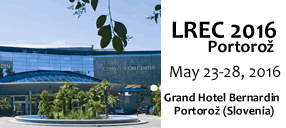
7th Workshop on the Representation and Processing of Sign Languages:
Corpus Mining
CALL FOR PAPERS
Abstracts are invited for a full day workshop on sign language resources, to take place following the 2016 LREC conference on May 28th, 2016. Recent technological developments allow sign language researchers to create relatively large video corpora of sign language use that were unimaginable ten years ago. Several national projects are currently underway, and more are planned. This workshop aims to share experiences from current and past efforts. What are the problems that were encountered and the solutions created? What are the linguistic decisions taken? How have the data been analyzed?
The special focus of this workshop is on Corpus Mining. If one counts Big Data by the storage capacities needed, sign language corpora do qualify as Big Data. It is a different story, however, when you count by any linguistic means, such as tokens. But even then, many people working on sign language corpora have the feeling that there is much more in their data than they are able to squeeze out now that there is much more material than one person can have an intimate knowledge of. Thus, there is an increasing demand for methods to detect interesting data within sign language corpora. There are at least three dimensions to address:
We see the first applications drawing synergies from combining these methods.
The workshop will discuss methodologies, best-practice examples, linguistic data, and also applications of corpora within and beyond sign language linguistics. For sign language technologies, five areas will be in the focus:
It is expected that two out of four sessions will be devoted to the focus topics, whereas the other two will cover more general sign language corpus issues. So we invite abstracts for 20-minute papers or posters (with or without demonstrations) on the following topics:
Corpus Mining
General Issues on Sign Language Corpora and Tools
Papers (4-8 pages) of both oral/signed presentations and poster presentations of this workshop will be published as workshop proceedings published on the conference website.
Please submit your abstract through the LREC START system not later than Feb 6th, 2016 Feb 12th, 2016, indicating whether you prefer an oral/signed or a poster presentation. In the latter case, please also indicate whether you plan to combine the poster with a demo.
When submitting a paper from the START page, authors will be asked to provide essential information about resources (in a broad sense, i.e. also technologies, standards, evaluation kits, etc.) that have been used for the work described in the paper or are a new result of your research. Moreover, ELRA encourages all LREC authors to share the described LRs (data, tools, services, etc.), to enable their reuse, replicability of experiments, including evaluation etc.